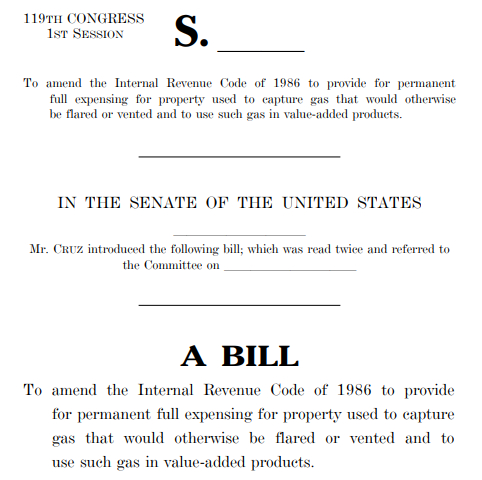Texas Senator Ted Cruz has introduced a new bill aimed at incentivizing Bitcoin miners to use flared natural gas, a byproduct of oil extraction often wasted—to power mining operations. The legislation, titled the Facilitate Lower Atmospheric Released Emissions (FLARE) Act, is designed to curb emissions while bolstering Texas’ status as a crypto mining hub.
The proposal has already gained support from the Digital Power Network, a crypto mining advocacy group, and major U.S. miner MARA Holdings (Marathon Digital), which praised the bill for its potential to “reduce emissions and unlock stranded energy.”

If passed, the FLARE Act would amend the U.S. Internal Revenue Code to provide tax incentives to companies that capture gas otherwise flared or vented and use it for value-added products, including powering digital asset mining operations.
The bill outlines that eligible operations must begin service in 2026 or later, creating a forward-looking incentive for infrastructure buildout and energy innovation.
Notably, the legislation includes national security provisions that prohibit entities owned or affiliated with countries such as China, Iran, North Korea, or Russia from accessing the same cost-recovery benefits. The restriction reflects growing concern over foreign influence and infrastructure control within the U.S. energy and crypto sectors.
Cruz Aligns Bitcoin Advocacy with Broader GOP Strategy
Cruz, who has served in the U.S. Senate since 2013, has increasingly aligned with pro-crypto elements of the Republican Party. A known supporter of Bitcoin, Cruz has previously introduced legislation to block the creation of a U.S. central bank digital currency (CBDC), a move in line with President Donald Trump’s anti-CBDC stance.
As of August 2024, Cruz disclosed personal holdings of up to $100,000 in Bitcoin, further signaling his alignment with the crypto industry both politically and financially.
While the FLARE Act is gaining support among crypto-friendly policymakers and miners, its path through Congress remains uncertain. Lawmakers are currently juggling multiple crypto-related priorities, including:
- Stablecoin regulation
- Digital asset market structure frameworks
- Potential bans on U.S. CBDCs
- Crypto access in retirement investment accounts
Against this backdrop, Cruz’s bill adds a climate and energy innovation dimension to ongoing crypto debates, potentially broadening its appeal across party lines.
Merging Energy Innovation with Bitcoin Infrastructure
Texas has become a hotbed for Bitcoin mining, with companies like Marathon Digital, Riot Platforms, and CleanSpark already operating massive facilities in the state. The FLARE Act could further boost this ecosystem by providing a cost-effective and sustainable energy source, while also helping oil producers reduce methane emissions.
By turning environmental waste into blockchain infrastructure, the bill presents a rare intersection where crypto, energy, and climate goals may align if lawmakers choose to prioritize it.





